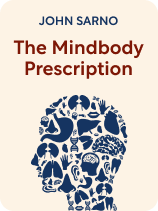

This article is an excerpt from the Shortform book guide to "The Mindbody Prescription" by John Sarno. Shortform has the world's best summaries and analyses of books you should be reading.
Like this article? Sign up for a free trial here.
What are the three components of the mind? How do the three components explain the psyche?
The three components of the mind, according to Freud, are the parent, the adult, and the child. Once you know what each of these components is like, you can understand your own psyche better.
Continue reading to learn about these components of the mind and how the concept has evolved over time through research.
Freud’s Three Components of the Mind
To understand why emotions manifest themselves as physical symptoms, we have to understand the nature of the psyche, or the emotional mind. Sigmund Freud identified three components of the mind, which go by different names in different contexts. Freud referred to them as the superego, the ego, and the id. Some use the terms parent, adult, and child respectively because these terms make more sense in the context of mindbody disorders.
The parent is the part of our mind that serves as our moral compass and pushes us to be “good.” This is what drives us to work hard and be thoughtful toward others, but it also gives us perfectionist tendencies and makes us worry about not being good enough or successful enough. The child part of the mind is narcissistic, dependent, irrational, irresponsible, and concerned only with pleasure.
The constant fighting between the child and parent produces the rage that causes so many mindbody disorders. The parent wants us to be good, but the child feels enraged by this expectation. For example, the parent knows that working to earn a living is a sign of success and responsibility, so it compels us to work, but the child is infuriated by this imposition on its time, energy, and freedom.
| Eric Berne: The Psychologist Behind the Adult, Parent, and Child Theory Some attribute the theory of the three components of the mind to Freud and other unnamed psychoanalysts, but the designation of the parent, child, and adult actually comes from the theories of social psychologist Eric Berne. While Berne’s work was greatly informed by Freud’s, his theories differed significantly. In Games People Play, Berne describes these three components as “ego states,” and he suggests that we behave differently depending on which ego state we’re currently in (in contrast with the more Freudian explanation, which suggests that the role of these three components is largely internal). Additionally, Berne describes some positive traits of the child, while the other approach focuses mainly on the negatives. According to Berne, the child is the source of our creativity, spontaneity, and intuition. He also suggests that the child is the most valuable aspect of one’s personality. Berne also suggests a more social factor in the role of the ego states. He explains that when someone treats us as a child—for example, when we’re scolded by someone else for something “bad” we’ve done—it activates the child ego state, which then causes us to behave in a childlike way. So while some focus is on how the parent and child interact within our psyches, Berne emphasizes how external social interactions bring out these different states. |

———End of Preview———
Like what you just read? Read the rest of the world's best book summary and analysis of John Sarno's "The Mindbody Prescription" at Shortform.
Here's what you'll find in our full The Mindbody Prescription summary:
- A look at the chronic pain epidemic that's plaguing the Western world
- That the key to solving your pain is resolving your emotional tensions
- Why modern medicine doesn't recognize mindbody connection






